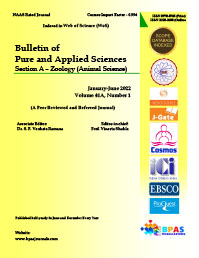Water and Coastal Water Vegetation of Various Types of Waters in The Samarkand Region
DOI:
https://doi.org/10.48165/Keywords:
aquatic plant, growth, formation, association, longline, herbage, flood plants, hydrophyteAbstract
In the study of hydrobiology of water basins, a separate study of higher plants is required. Higher plants growing in water for aquatic organisms remain not only a habitat, a nutrient, a source of oxygen, but they are also important in the course of many biological processes in this environment. The vegetation of aquatic and coastal aquatic plants weakens the rate of flow of water, impedes the movement of silt and mineral particles, has anti-erosion significance and is used to strengthen the banks of water bodies. Among the higher aquatic and coastal aquatic plants, many species have diverse uses as a raw material for the pulp and paper, medical, perfume industries, building materials, fertilizers for the fields, food for people and pet food.
Downloads
References
Gopal B. 2009. Biodiversity in Wetlands // Maltby E., Barker T. (eds.) The Wetlands Handbook, 2 Volume Set. Chichester, UK, Hoboken, NJ; Wiley-Blackwell. P. 65–95. 2. Kirilyuk V.E., Tkachuk T.E., Kirilyuk О.K. 2012. Vliyanie izmeneniy klimata na mestoobitaniya I biotu b Daurii [Impact of climate change on habitats and biota in Dauria] // pp 46-62. Environmental and water management aspects. Collection of scientific papers of the State Natural Biosphere Reserve. "Daursky". Chita, Express Publishing. Release 5. 3. Kirilyuk V.E., Obyazov V.A., Tkachuk T.E. & Kirilyuk O.K. 2012. Influence of Climate Change on Vegetation and Wildlife in the Daurian Eco-region // Eurasian Steppes. Ecological Problems and Livelihoods in a Changing World. Dordrecht; Heidelberg; New York; London, Springer. P. 397–424.
Kadlec R.H. & Wallace S.D. 2009. Treatments wetlands. 2nd ed. Boca Raton; London; New York, CRC Press Taylor & Francis Group.. 1000 p.
Kirichenko K.A. 2015. Vozmojnosti ispolzovaniya vysshix-vodnyx rastenie dlya biomonitoringa ekologicheskogo sostoyaniya vodoyomov Baikalskogo regiona [Possibilities of using higher-aquatic plants for biomonitoring the ecological state of water bodies of the Baikal region] // pp 133-136. Hydrobotany 2015. Proceedings of the VII All-Russian Conference with international participation on water macrophytes. Borok,
Scherbakov A.B. 2015. Izucheniya vodnyx flory Sredney Rossii na sovremennom etape, yyo dinamika I perspektivy dalneyshego izuchenie [The study of aquatic flora of Central Russia at the present stage, its dynamics and prospects for further study] // pp. 60-62. Hydrobotany 2015. Proceedings of the VII All-Russian Conference with international participation on water macrophytes. Borok.
Papchenkov V.G. 2003. O klassifikasii rasteniy vodoemov I vodotokov [On the classification of plants of water bodies and streams] pp 23-26 // Hydrobotany: methodologies and methods. Materials school on hydrobotany. Borok.
Lisitsyna L.I. 2003. Gerbarizasiya vodniy rasteniy, oformlenie kolleksiy [Herbarization of aquatic plants, decoration collections]; pp. 49-55 // Hydrobotics: methodology, methods: School materials on hydrobotany. Rybin.
Oprediletel rasteniy Sredney Azii. 1968. [Key to Central Asian plants]; pp. 225 // Tashkent, Volume I.
Laktionov A.P., Meshcheryakova N.O., Pilipenko V.N. 2014. Flora vodoyomov I vodotokov Astraxanskiy oblasti [Flora of reservoirs and watercourses of the Astrakhan region]; pp. 407. Astrakhan.
Metody polevyx ekologicheskix issledovaniy 2014. Otv. Redactor A.B. Ruchin. [Field Ecological
Research Methods]; pp. 407. Textbook, Saransk; Pushta
Nurniyozov A.A., Tashpulatov Y.Sh. 2019. Poleznye vodnye i pribrejnye rasteniya Samarkandkoy oblasti (Uzbekistan) [Useful aquatic and coastal plants of the Samarkand region (Uzbekistan)]; pp. 85-88. // Bulletin of science. - Tolyatti, № 6.
